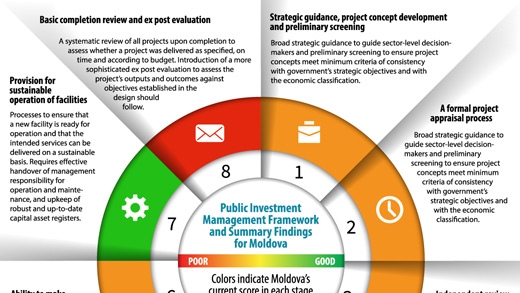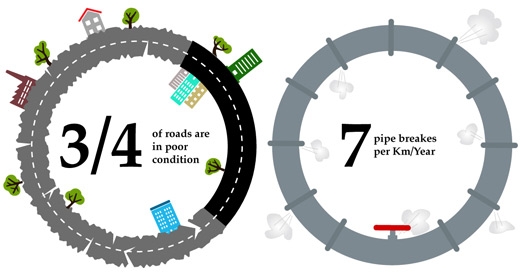Improving public infrastructure within a constrained fiscal envelope is possible, if the country can strengthen its public investment processes and policies in a way that any project, big or small, can be selected, undertaken and finished in a timely and cost-effective manner, according to a World Bank report.
The key to achieving this is to improve the selection process for projects and prioritize completing those that are ongoing. Moreover, the quality of preparation for new projects must be raised by introducing a systematic preliminary screening process for all projects, and a rigorous assessment of the economic feasibility and financial sustainability of major projects, according to the report entitled "Capital Expenditures: Making Public Investment Work for Competitiveness and Inclusive Growth in Moldova."
The report also recommends strengthening the Ministry of Finance’s role in gate-keeping the budget process, which could yield a more credible, disciplined process with fewer poor quality projects introduced into the budget without following due process.
Moldova has an active pipeline of current projects across sectors such as agriculture, healthcare, education, transport and utilities. In partnership with the World Bank, for instance, it has about $162 million allocated across seven active projects spanning various sectors.
But projects, especially the smaller ones that the country undertakes on its own, can be more effective if they follow a framework of eight steps – from project concept development and screening to a review and evaluation of completed projects. Actively monitoring the financial and non-financial performance of projects is especially useful to make public investment more efficient, the report suggests. Also (and as highlighted in a separate Public Expenditure Review Report that built on these findings to examine specific challenges for subnational governments), local governments should be empowered to select, monitor and finance the projects that are relevant for them.
Public Investment Management Diagnostic Framework and Summary Findings for Moldova

Open as a large image or as a printable document
To be successful with improving the effectiveness of capital expenditures, the report underlines the need to address specific sector-level challenges:
- For the transport sector, it is important to prioritize investment projects based on objective criteria, so available resources can be funneled to projects with the highest expected economic and social impact. It is also important to implement the new maintenance rules for roads and, at the local level, to establish clear rules for local road maintenance and rehabilitation allocations.
- In the utilities and housing area, it is important to strengthen procurement and administrative skills of local governments and utility companies to increase absorption of donor funds, develop technical standards and guidelines for water and sanitation infrastructure design, construction and operation to maximize the use of available resources, and pool resources and capacities, searching for economies of scale.
- For the education sector, it is especially important to prioritize and improve screening to ensure capital spending helps provide equal opportunities, and to improve monitoring (notably with non-financial indicators and a more programmatic approach).
- For the health sector, key elements include strengthening strategic guidance and rationalizing the hospital network to improve efficiency and equity in healthcare access.
- In agriculture, critical steps include evaluating past and ongoing programs to develop a new strategy for agriculture and rural development with a more selective investment subsidy program, focusing on supporting market competitiveness and integration, while fostering growth and equity through greater inclusion of smaller-scale farms into subsidy programs.
A regulation adopted by the Government of Moldova in December 2013 established a framework to reform public investment management, including many of the steps highlighted in this report. Still, the agenda for improving the efficiency and equity of public investments in Moldova remains large. In addition to implementing the newly adopted regulatory framework, further improvements in monitoring could inform future adjustments. Also, accompanying measures will be needed to extend improvements in public investment management to the local level.
Download full report (PDF, 96 pages)


